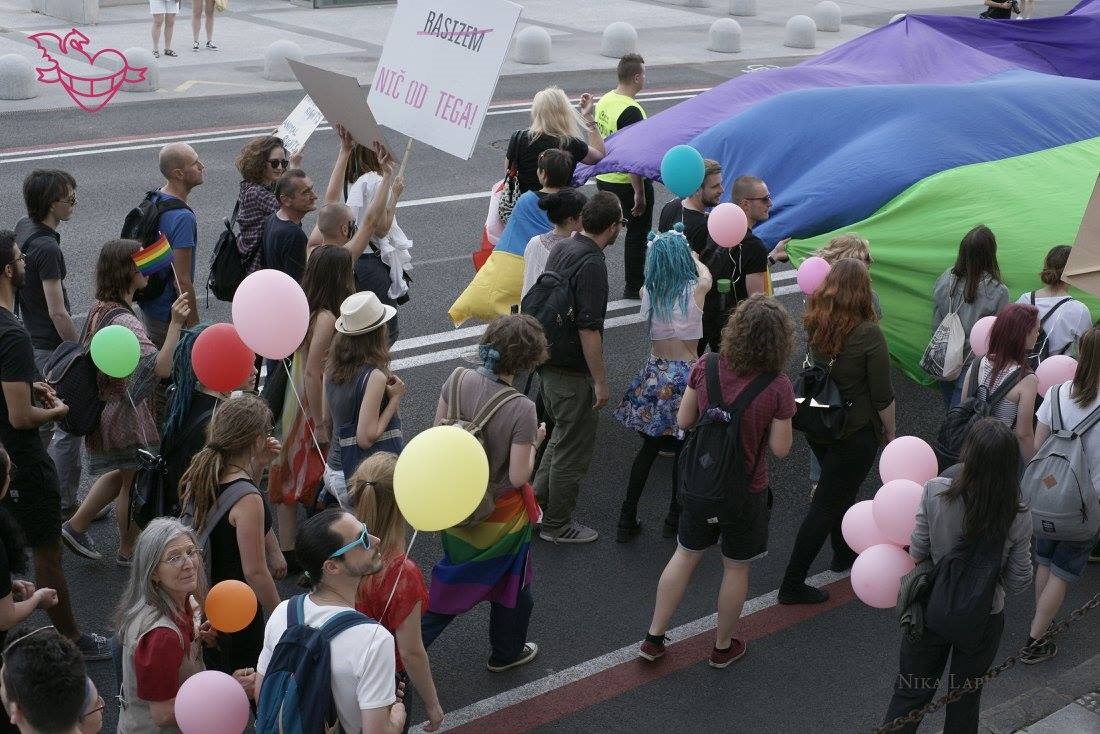
Fighting for LGBTIQ+ rights through an intersectional lens
How Ljubljana Pride Association in Slovenia is applying an intersectional approach in their work and trying to tackle social justice and inclusion in a holistic manner.
Gender, sexual orientation, gender identity, gender expression already reflect intersectional positions and demand an intersectional approach. Unfortunately often it is not perceived as such. Society doesn’t know or doesn’t want to see the problematic construct behind it and unique positions individuals and groups are facing in everyday life as a result of the binary system(s) we are living in. Manifestations of homo-/bi-/trans-phobia, heterosexism and trans misogyny often intertwine with other oppressions (sexism, racism, classism, ableism etc.). So things become even more complex. But in most cases state(s) and policies only use a one-dimensional approach towards addressing these issues. If at all.
Ljubljana Pride Association, being primarily an LGBTIQ+ [[Lesbian, gay, bisexual, transgender, intersex, queer and persons of other non-normative gender identities and/or sexual orientations]] organisation, focuses on safeguarding the human rights and interests of LGBTIQ+ people, especially marginalised social groups of young LGBTIQ+ people, empowering and supporting them. Our values derive from LGBTIQ+ human rights, anti-racism and intersectional justice principles so our work and activities reflect a strong intersectional approach to the phenomena of social marginalisation, discrimination and exclusion. We are trying to tackle social justice and inclusion in a holistic manner.
For example, for the last two years we have been developing a programme to address LGBTIQ+ people who face housing deprivation and actively engaging LGBTIQ+ youth who experience homelessness in the LGBTIQ+ community (programme SQVOT [[a programme to reduce the risk of housing exclusion for LGBTIQ+ young people]]). The work we are doing includes research, counselling, crisis accommodation for LGBTIQ+ youth at risk of homelessness, and collaboration with other organisations in Slovenia working in the area of homelessness, youth work and representing other marginalised groups.
We are also addressing (young) LGBTIQ+ people with mental health issues and are providing counselling for them in our volunteer programmes.
An intersectional approach is at the core of our projects focusing on tackling hate speech, anti-bullying and inclusive youth work. Together with different organisations from across Europe that are using an intersectional approach, we developed several manuals for youth workers and people working with young people, organisations and their representatives. With the help of our Pool of trainers we are delivering workshops and trainings on the topics within our non-formal educational programme, where we are using methods such as storytelling to make people relate and better understand the complexity of intersectionality and discrimination.
We are constantly trying to reflect on our work through an intersectional lens.
We are striving for inclusive work with volunteers, making sure our spaces are as accessible as possible, being part of coalitions and networks that are putting an intersectional approach at the centre of their work, developing more and stronger collaborations with other organisations and networks in Slovenia and abroad that have an intersectional approach and that represent the most marginalised groups. And we are constantly trying to reflect on our work through an intersectional lens.
The challenges we are facing are significant, since the political situation in Slovenia became in the last six months drastically more hateful and hostile towards marginalised groups, as well as independent media and organisations fighting for human rights. We are facing more and more hateful speech and attacks on our work based on intersectionality. We encounter by far the worst types of scrutiny and online hate when addressing racism and the connections of the systems of oppression we live in to historic and systemic racism in Europe. We are fighting these new attacks by exposing them to the public, making the dynamics as visible as possible and trying to create a public space where that would be at least reported on, and possibly discussed. We will need even stronger coalitions and determination to fight to make a profound change in society and politics.
Tadeja Pirih works at the Ljubljana Pride Association – Društvo Parada Ponosa.



